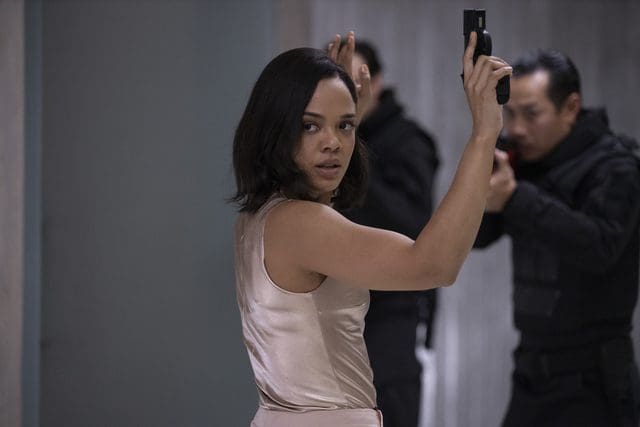
Westworld Season 3 has done a very good job of keeping the per episode storytelling neat, and efficient. Usually, there’s one major arc, with a couple small diversions as we check in on our other characters. We’ve seen episodes focus mainly on Dolores (Rachel Evan Wood, The Wrestler), Caleb (Aaron Paul, Breaking Bad), Hale (Tessa Thompson, Thor: Ragnarok), Bernard (Jeffrey Wright, O.G.), and Maeve (Thandie Newton, RocknRolla).
Last week, ‘Genre’ broke that mold by focusing on one storyline told from two very disparate viewpoints. The first centered on Dolores pulling the curtain back on the Rehoboam program Serac (Vincent Cassel, Ocean’s Thirteen) had designed — which pre-determined the fate of every human — her stated intentions for this being the “freeing” of humanity, much like she had previously “freed” the hosts (albeit with similar, violent results). The second narrative strand explored Serac’s history in order to give us the necessary information to understand his motives for creating the program: saving humanity from itself. This threw the audience into complete doubt over whose motives were the right ones.
Westworld Season 3 Episode 6, ‘Decoherence’ ups the ante by tackling three very intense, yet three very distinctive storylines — all of which do intersect at some point — but all of which stand on their own. The result of this break in narrative structure for the series reflects the unraveling of the series’ society, but also it serves as an indication that we’re coming to the violent climax of this season.
The first, and possibly the least interesting of these three storylines was Maeve’s, and this is unfortunate because Maeve’s storyline this season has been stuck in neutral. We know she’s destined for a battle with Dolores, but the season hasn’t given her much to do — outside of a constant replay of her batting/killing Nazis in World War II Italy. There was a glimmer of hope for this story when Dolores (the Connells implant version) and Maeve squared off in a war of words. However, this scene crystallizes the big issue with Maeve — when it comes to Dolores she’s always non-committal. She always considers Dolores an adversary, but she always seems reluctant to go after her. I hope the season pulls the trigger on Maeve choosing a definitive side in this battle.
The William (Ed Harris, The Truman Show) storyline was probably the most visually and viscerally dynamic story of the season so far. Ed Harris chews literal and figurative scenery in this scenes, and the big scene where he confronts the different stages of himself — featuring the return of Jimmi Simpson’s Young William — was a bold creative choice, but one Harris easily executed with the ability to go from disaffected to murder in two seconds flat. His choice to become the hero, or as some are dubbing him “The Man in White” and teaming with Bernard makes all the sense in the world, and seems like such a Dolores move. Why wouldn’t she want an all-powerful billionaire, with a penchant for “violent delights” working with her (whether he realizes or not) in taking down Serac and freeing the world.
The Charlotte Hale storyline easily featured the most gripping, white knuckle, and utterly shocking moments of the entire season so far. The Hale story has focused on Hale (who’s actually Dolores) allowing her emotions (particularly for her family) to bleed through her facade. Her fear for their safety propels the tension of the episode’s best scenes throughout her run and gun corporate spy arc. Tessa Thompson is just such an utter bad ass — both physically and verbally throughout the episode. She cuts people down with her words as easily as she does her trigger finger. The giant mech armor is my only quibble with this arc as the effects felt a little Tennant-era Doctor Who, and not the sleek high level of effects the series is renowned for.
However, it’s the ending of the arc (no spoilers, I promise) that is the biggest gut punch of the season. It’s something you were expecting, but even when it happened you find yourself mouth agape, hands clutching your hair. The effects work here is just breathtakingly good, again without ruining it, it’s just something when you see it, it will utterly floor you.
‘Decoherence’ was the most narratively ambitious episode of the third season to date. The performances from Thompson, Harris, and Newton (as well the cameo work from Peter Mullan as James Delos) were outstanding, and bolstered an already skillfully designed narrative. Westworld, more than ever, is ramping up in the most precise and most dramatic way possible as it nears its season (and possibly series) finale. With two episodes left, and a high bar already set — as cliche as this sounds — what can this series do next to blow us away?


Comments are closed.